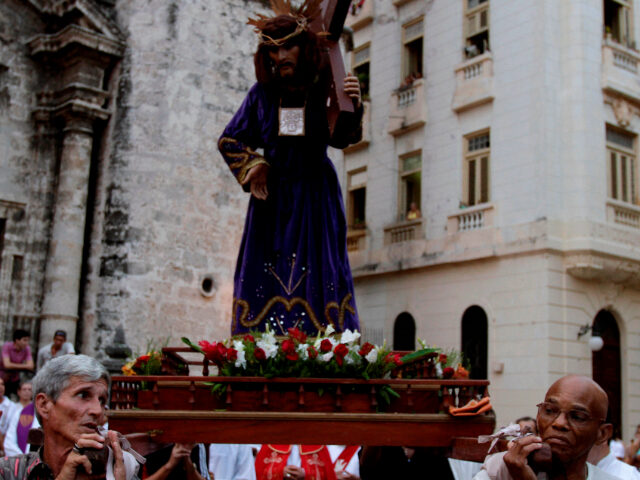The Communist Party of Cuba reportedly banned Christians from celebrating traditional Catholic Holy Week processions across several regions of the country in anticipation of Easter, including processions observed on Good Friday.
Catholics mark Holy Week every year to commemorate the Passion, death, and resurrection of Jesus Christ. As it is a moveable observance, 2024’s Holy Week began on Palm Sunday, March 24, and concludes on Easter Sunday, March 31.
Initial reports indicated that the Castro regime had limited its prohibitions to the Bayamo-Manzanillo diocese of eastern Cuba, where hundreds took to the streets in mid-March to peacefully demand freedom and object to the inhumane conditions to which communism subjects them. Catholics have prominently led the organization of dissident activity in the country, including priests and nuns.
ACI Prensa, the Spanish-language division of the Catholic News Agency, reported on Wednesday that the ban extended to other Cuban cities, including the capital city of Havana. A local source, who preferred to remain anonymous out of fear of repercussions from the Castro regime, told ACI Prensa that the prohibitions seem to be motivated out of fear of possible new protests, such as those seen in Bayamo and Santiago de Cuba.
Fray Lester Zayas, a priest of the Sacred Heart of Jesus Parish located in Havana’s El Vedado district, denounced that the Castro regime had forbidden the parish to conduct the procession of the Holy Burial, a penitential religious parade that takes place in the afternoon of Good Friday that observes the burial of Jesus Christ after his death on the Holy Cross.
The fray told ACI Prensa that the refusal to allow the procession was a “punishment” for his statements against the communist regime, denouncing the ban as a violation of religious freedom for the Cuban Catholic faithful.
“The refusal seems to be related to my person. Apparently, my homilies make some people uncomfortable or nervous,” Fray Zayas said.
“Never in my years of priesthood have I ever made use of public space, say during processions, to exhort anything other than piety,” he continued. “I am very conscious of the public space and maximum defender of a secular State, as to know how to distinguish between the public space that carries a type of treatment and the religious space that carries another one.”
An anonymous Catholic source told the independent news outlet Cubanet that in Bayamo, where the peaceful protests took place, a representative of the Office of Attention to Religious Affairs of the Central Committee of the Communist Party of Cuba announced the ban on processions.
The office is an institution that the Castro regime created in 1985 to control religious and fraternal institutions in Cuba. All such organizations must request permission from the Religious Affairs office to carry out processions and other activities.
“They did not give explanations, they never do. They just say yes or no,” the source said.
“The government is afraid that the procession will serve as a pretext to reactivate the protests; they are trying to avoid agglomerations,” the source added.
The prohibited Catholic processions and activities in Bayamo included the Palm Sunday festivities; the Via Crucis (Stations of the Cross), a traditional Catholic procession during Holy Week that commemorates Jesus Christ’s last day on Earth before his resurrection; and the Holy Burial procession.
Prisoners Defenders, a Spain-based human rights NGO, denounced the prohibitions of the Catholic processions as proof of the lack of religious freedom in Cuba.
The message read:
Cuba overwhelmingly represses religious freedom. This is indicated by five mandates (Rapporteurships and Working Groups) of the United Nations, the latest resolution of the European Parliament and organizations such as the Commission for International Religious Freedom of the United States.
The Cuban Observatory for Human Rights (OCDH), a non-governmental organization, denounced Wednesday that the Castro regime committed at least 936 acts against the exercise of religious freedom in Cuba during 2023.
OCDH, in its 2023 report on religious freedom in Cuba, found that 68 percent of the Cuban men and women interviewed knew someone who had been harassed, repressed, threatened, or hindered in their daily life by the Castro regime for reasons related to their faith.
Christian K. Caruzo is a Venezuelan writer and documents life under socialism. You can follow him on Twitter here.

COMMENTS
Please let us know if you're having issues with commenting.